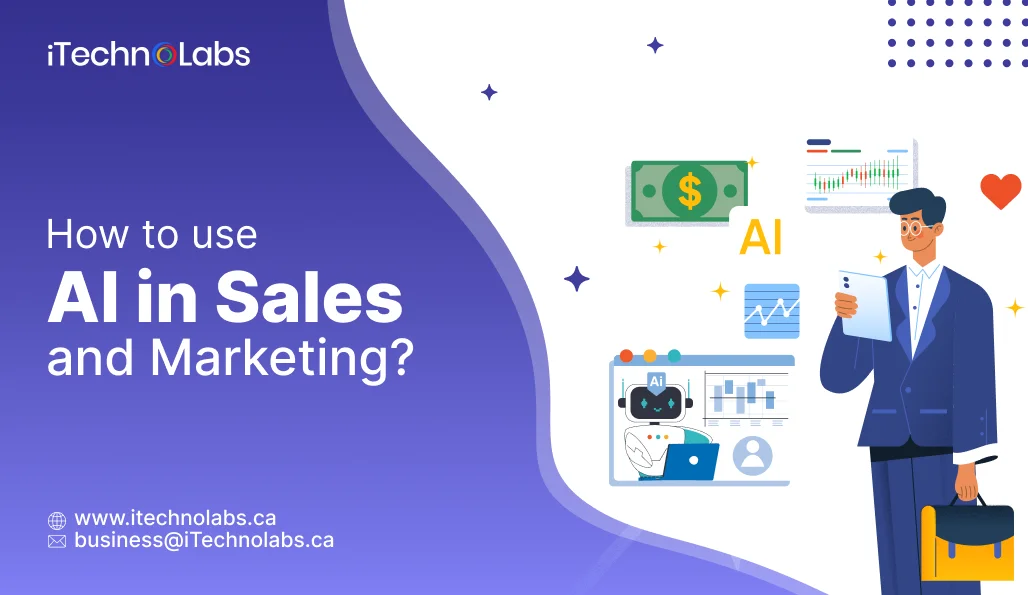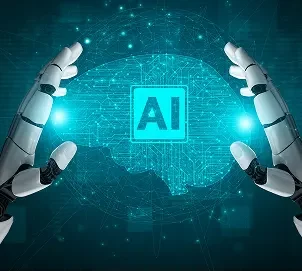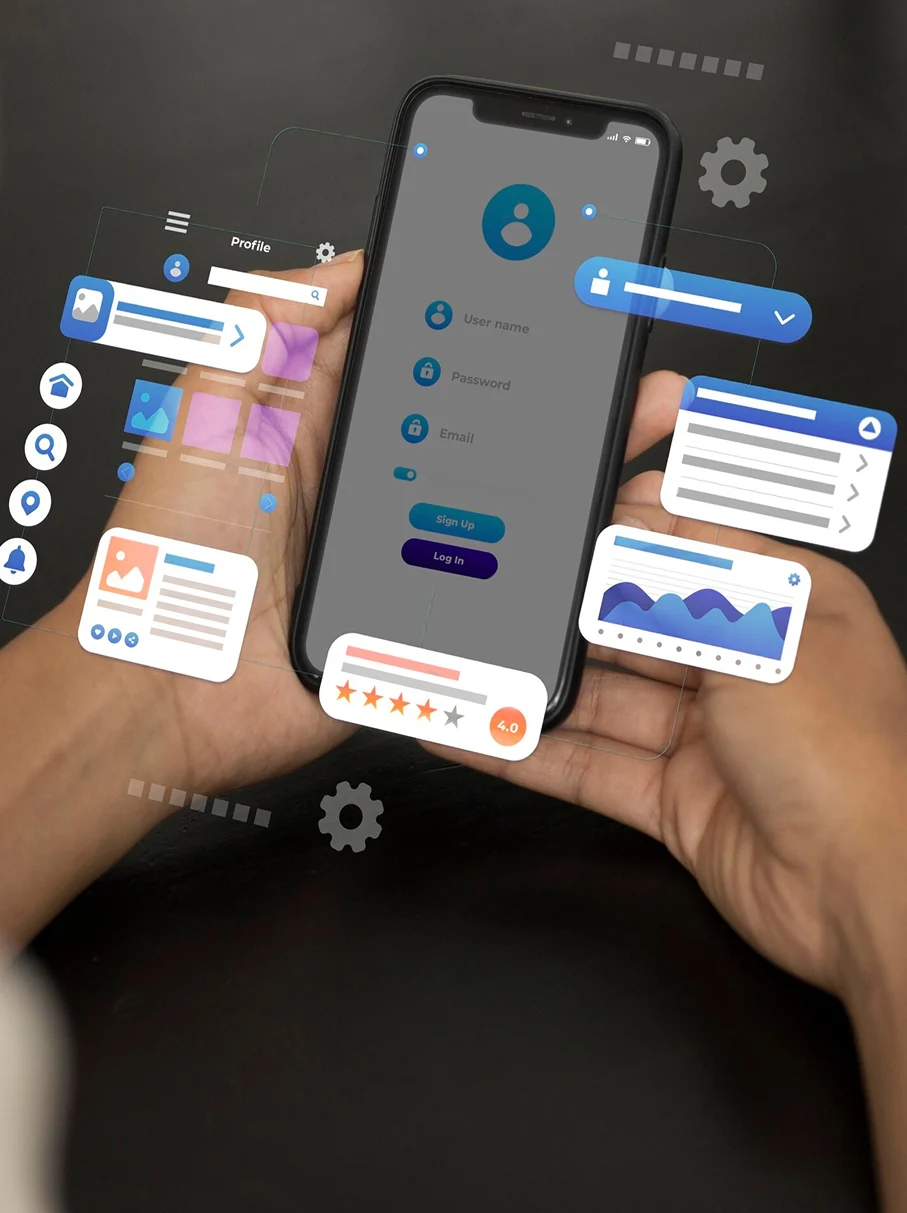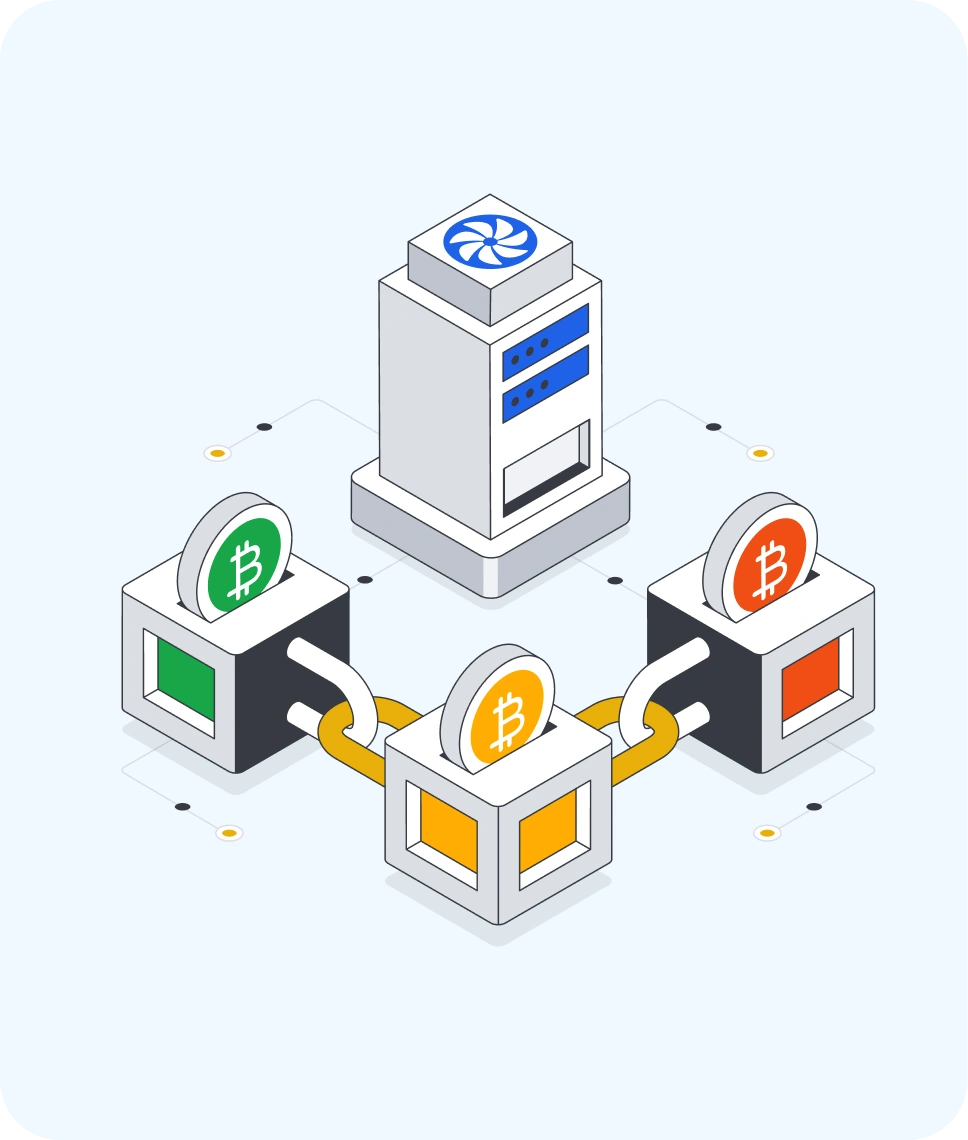AI is one of the most advanced technologies used in the world by thousands of businesses. Artificial intelligence helps in every department of a company, such as HR, finance, operations, IT, customer service, and accounts. Now organizations are even using it for sales and marketing. The benefits of this technology are so many in sales and marketing. AI in sales and marketing helps businesses automate tasks, improve lead generation, make data-driven decisions, and more. Read this blog to learn about AI in sales and marketing.
What is AI for Sales?
AI for sales is the process in which organizations use artificial intelligence (AI) to improve the efficiency and effectiveness of their sales operation. AI is an increasingly powerful tool for organizations to use across all departments, including marketing and HR. It helps sales teams better identify leads, keep prospects warm, and close sales, while moving people through the sales funnel quickly. AI-driven sales teams are likely to outperform those that do not use these AI sales technologies.
Using AI helps sales teams make quick choices. This brings more benefits to the company. Sales leaders really like using AI for work. It helps them see things faster and smarter. It is especially helpful in B2B sales scenarios where sales cycles are a bit longer and the costs of goods or services are often higher. Organizations are helping their sales enablement by encouraging AI use throughout the sales process.
Types of AI in Sales
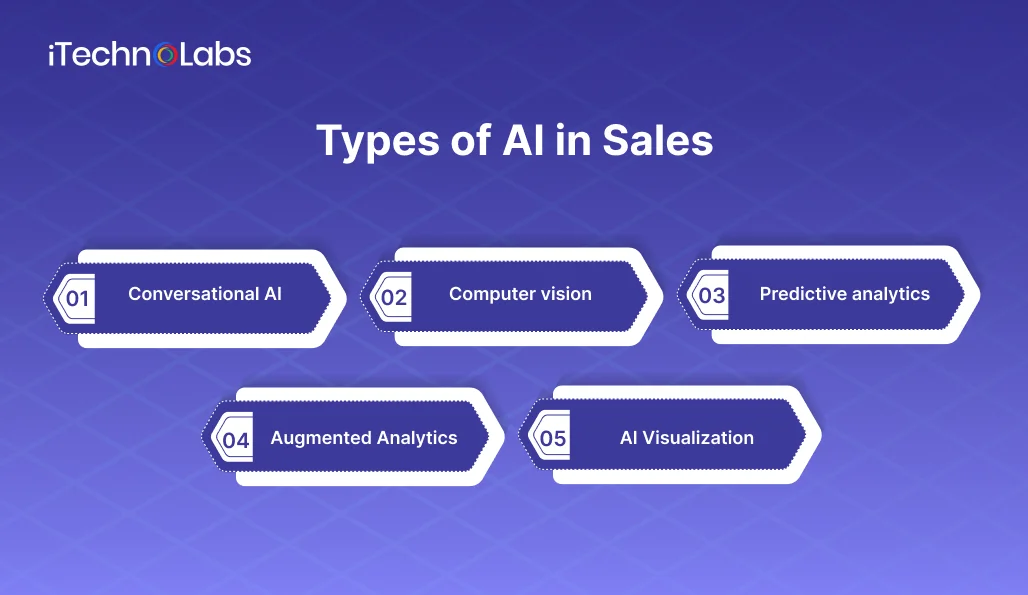
There are different types of AI technologies available in the market according to the distinct needs of every business. Knowing about all these technologies can help businesses figure out which one is best for them. The following are the common types of AI technologies in sales:
1. Conversational AI
These are technologies that converse with users. They use smart computers to talk like humans. These computers can speak many languages. Conversational AI helps sell things to people. It can suggest more products they might like.
2. Computer vision
This is another AI technology that uses machine learning and neural networks. Computer vision instructs computers and systems to identify insights from digital images, videos, and other visual inputs.
3. Predictive analytics
This approach takes historical first-party data and industry data to better understand what is likely to happen in the future. AI superpowers organizations’ ability to conduct predictive analytics and forecasting, making more accurate decisions about where sales growth will come from and what resources are needed to meet future sales goals.
4. Augmented Analytics
Augmented analytics is the future of data-driven decision-making. Augmented analytics platforms ingest vast amounts of data from multiple sources and analyze it in near real-time. The insights generated by these platforms are used to create predictive models and generate actionable recommendations for sales reps.
5. AI Visualization
AI visualizations serve several purposes in the sales process. AI helps sales teams see clear pictures fast. It shows which products people like most. Sales reps can find patterns and plan better. They can group customers easily with AI. Each group gets special deals and messages. This helps buyers get what they need. It also helps sales teams sell more.
AI in Sales Tools
Depending on the needs of businesses, different types of AI sales tools are available in the market. Every sales tool is different in terms of its features and capabilities. After evaluating all AI sales tools, a company can choose the best one. Here are some of the most commonly used AI sales tools:
1. Customer relationship management (CRM)
AI can supercharge how CRM tools store information and make it available for sales professionals. It can parse customer data to improve the taxonomy and organization of content. AI can improve CRM data by appending industries and titles to individuals in the database by scanning information on the web. It can help sales organizations in other ways. If an organization publishes a piece of content about the insurance industry, AI can identify all relevant parties in the organization’s database and create a list to whom representatives can send the content.
2. Sales automation
AI-driven automation can eliminate many time-consuming and repetitive tasks and accelerate workflows. Sales AI tools often use algorithms to automate sales operations, like adding information from customer calls and emails to a CRM database. AI can also streamline several key follow-ups to prospects after a sales call. It can send relevant materials, a draft, a follow-up message, and remind sales representatives when they need to call the prospect back.
3. Chatbots and virtual agents
These tools help salespeople save time every day. Chatbots answer simple questions from customers quickly. They use smart tech like AI and RPA. Chatbots talk to people and give good ideas. They collect data from chats for better talks. With AI, chatbots are even smarter and faster.
4. AI-powered CRM and Lead Scoring Systems
AI-powered CRM systems automatically collect and update customer data from every interaction—whether it’s an email, a website visit, or engagement on social media. These systems track and analyze behavior patterns, such as which links are clicked, how long a customer spends on a product page, and how frequently they open your emails. For example, when a prospect repeatedly visits the pricing page or interacts with a key product feature, AI flags this as a high-interest signal and alerts the sales rep.
5. Predictive Analytics for Sales and Forecasting
Predictive analytics tools analyze various data points, including historical sales performance, customer purchase behaviors, external market trends, and economic indicators. With this data, AI can forecast future sales opportunities or risks. For instance, if the system detects that sales from a specific region typically surge before the holiday season, it might recommend ramping up marketing efforts or preparing inventory early to meet demand.
Use Cases of AI in Sales
There are multiple use cases of AI in sales. Some common uses of AI in sales are automating repetitive tasks, boosting efficiency, enhancing productivity, and enabling personalized customer interactions. Here are some other use cases of AI in sales:
1. Sales engagement
AI helps managers and team members to better manage their sales activities. It lets them rapidly move through the sales funnel. AI can show the salesperson the entire history of customers. This allows the sales representatives to better assist the customers.
2. Sales forecasting
AI can analyse past purchases of all customers. This helps it to predict when they are likely to make their next purchase. When salespeople know about the exact buying timing of customers, they can send them a product notification. This will help the sales team capitalize on when the customers are in the mood to buy.
3. Call summary automation
AI can extract a complete summary of a call and transcribe it to salespeople. This lets the sales team focus on answering customers rather than typing, which will help in better engagement with customers. It can also create an email list, which makes the work of the sales team easier.
4. Lead scoring
No two customers are the same at all. AI can identify the unique characteristics of every person. AI can collect different data points and find out when a person is likely to make a purchase. This will help sales representatives know which customers need more time.
5. Data collection and analysis
Humans have limited capability for everything. The same applies to data collection. AI can collect massive datasets in a few minutes. This prevents the sales representative from manually entering all data and wasting time. With AI in sales and marketing, it saves the time of employees so they can focus on selling products to customers.
Benefits of AI in Sales
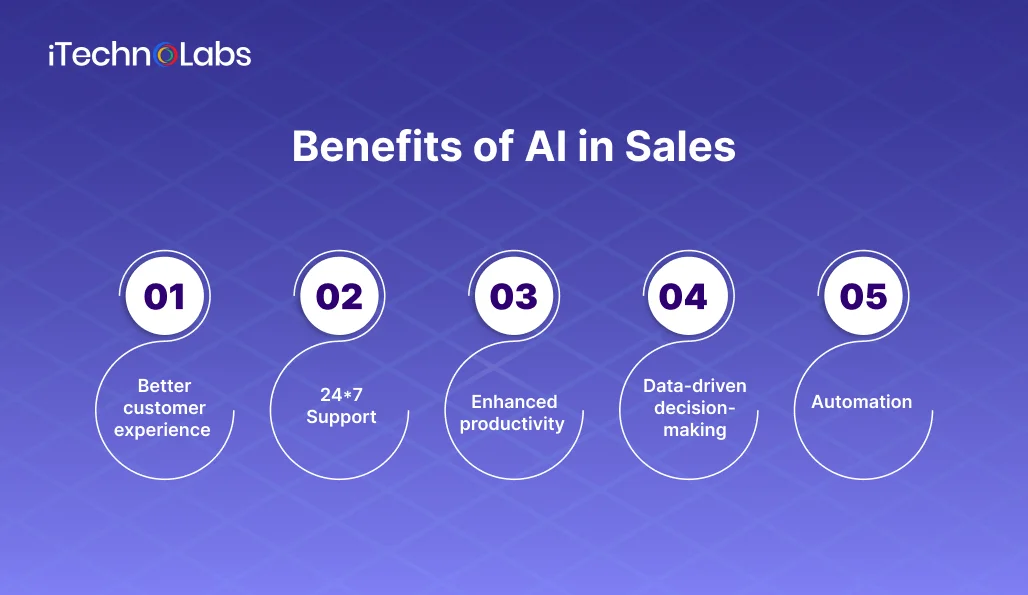
AI in sales is helpful in many different ways for companies worldwide. It not only saves time, money but also helps to improve efficiency, productivity, and many other things. Let’s see some of the benefits of AI in sales:
1. Better customer experience
AI can analyze the buying history of customers. This helps sales reps to create personalized recommendations based on the unique traits of every customer. The right product recommendation means customers will welcome the notifications. This will also help to increase the sales and, as a result, revenue. Further, the sales teams can quickly answer customers’ queries, which means they will be satisfied.
2. 24*7 Support
Unlike human employees, AI agents and chatbots are available round the clock to help customers with anything. This means that no customer call or chat will go unanswered, as they are available every time. AI in sales can provide non-stop service to customers through different channels such as social media, chat, email, call, etc.
3. Enhanced productivity
AI in sales can do repetitive tasks for sales teams and make them free to do other important chores. This helps to achieve high levels of productivity since now employees can focus on value-driven work and do more in less time. AI can also help reduce errors in sales processes, which increases efficiency.
4. Data-driven decision-making
Another benefit of AI in sales is that it can analyze massive amounts of data. It can detect patterns and trends in people’s buying history. This removes the guesswork from operations, and salespeople can directly make personalized recommendations that attract more customers. Further, AI doesn’t always need structured data. It can analyze and find insights from unstructured data such as images, PDFs, audio, videos, etc.
5. Automation
AI in sales helps to achieve automation. AI tools and frameworks can take care of monotonous tasks such as creating an email list, collecting data, creating personalized recommendations, and more. When AI is doing all these tasks, sales reps can focus on high-value tasks that AI can’t do. They can focus on making strategies for the future.
What is AI marketing?
AI marketing means using smart computers to help in marketing. It collects and studies data. It understands language and learns from it. It helps teams work faster and better. It can create content easily. It also improves customer experience and gives more accurate results.
With the increasing utility of generative AI, marketing departments use the technology to instantly create hyperpersonalized marketing materials, distill insights from customer data, and iterate on existing marketing strategies. Given the vast amounts of omnichannel data processed by marketing departments and the value of leveraging that data, AI adoption is increasingly critical for businesses that want to remain competitive. According to the IBM Institute for Business Value’s annual CEO study, over 70% of the highest performing executives that were surveyed believe that competitive advantage depends on having the most advanced generative AI.
Suggested article: AI Voice Agents: Create Smart Assistants with AI Voice Generators
Benefits of using AI in Marketing
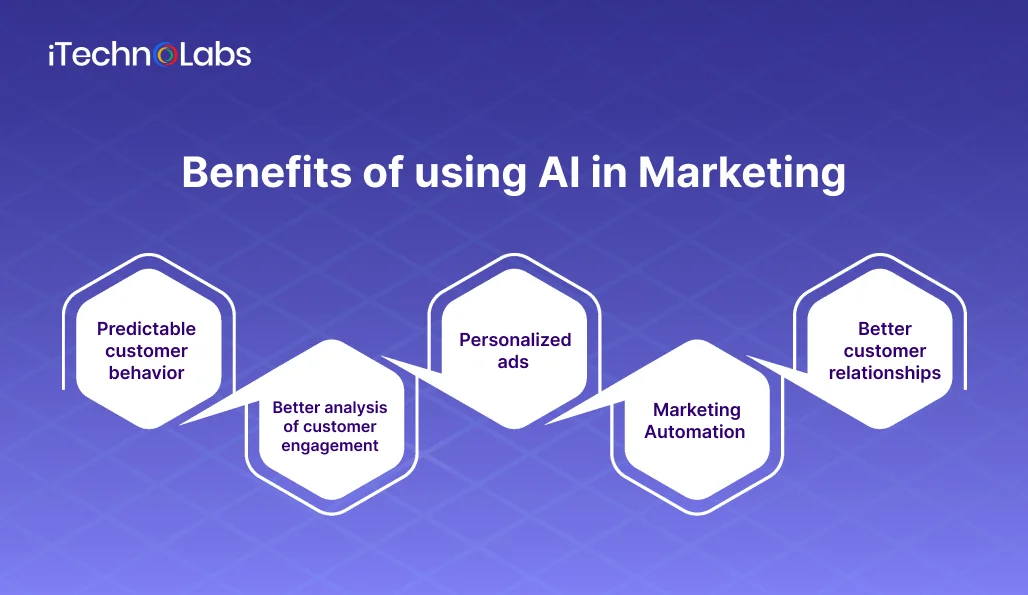
AI in marketing offers a wide range of benefits. The benefits include informed decision-making, accurate measurement of KPIs, improved customer relationships, and meaningful insights from customer data. Below you can see some advantages of using AI in marketing:
1. Predictable customer behavior
AI helps marketers understand customers better. It studies how people behave online. This helps find who is most likely to buy. You can use AI to check old data. It shows what works and what doesn’t. AI also finds patterns in customer actions. These patterns help plan better marketing ideas. You can use it to get more website visitors. It can also help make more sales. AI saves time and money while giving great results. It helps you reach your goals faster and smarter.
2. Better analysis of customer engagement
AI helps marketers understand customers better. It studies how people react to ads. It shows which campaigns work the best. AI tells who likes your products more. It compares old and new customers easily. It helps you find your best buyers. AI also tracks what people talk about online. It shows what your audience wants from you. Marketers can use this to make better plans. It helps them talk to customers in smarter ways. AI makes shopping more fun and personal. Some companies even use AI with VR. This lets customers try products before buying them.
3. Personalized ads
AI helps marketers show the right ads. It studies what people like and need. This helps in finding the right audience. AI can predict who may make a purchase soon. It also helps make messages more personal. Chatbots and smart designs facilitate easy communication with customers. This makes people feel understood and special. Old ads that were shown to everyone don’t work now. AI makes ads smarter and more useful. It helps eLearning companies reach real learners faster. With AI, marketers save time and money. They also make better choices and sell more.
4. Marketing Automation
Another benefit of using AI in marketing is automation. AI tools can create personalized campaigns for customers and make marketing people free to do value-driven tasks. With AI, you can get an upper hand. The AI systems are advanced enough to do PPC (pay-per-click), SEM (search engine marketing), SEO, social media marketing, and many other tasks. Not just this, even content creation can be done using AI tools. It can automate tasks like email marketing, lead scoring, and posting on social media.
5. Better customer relationships
AI can help foster good relationships with customers. AI can collect real-time insights and help the marketing team serve customers better. AI can also let the marketing team know about any concerns. It uses statistical models to save the time and effort of marketing people. The company can add an autonomous chatbot to the website. This will give a complete overview of the services of the company to the viewer. The AI tools can monitor the data of a website and tell if the customer is likely to purchase something. By capitalizing on this insight, companies can send product recommendations to customers and increase sales.
Use Cases of AI in Marketing
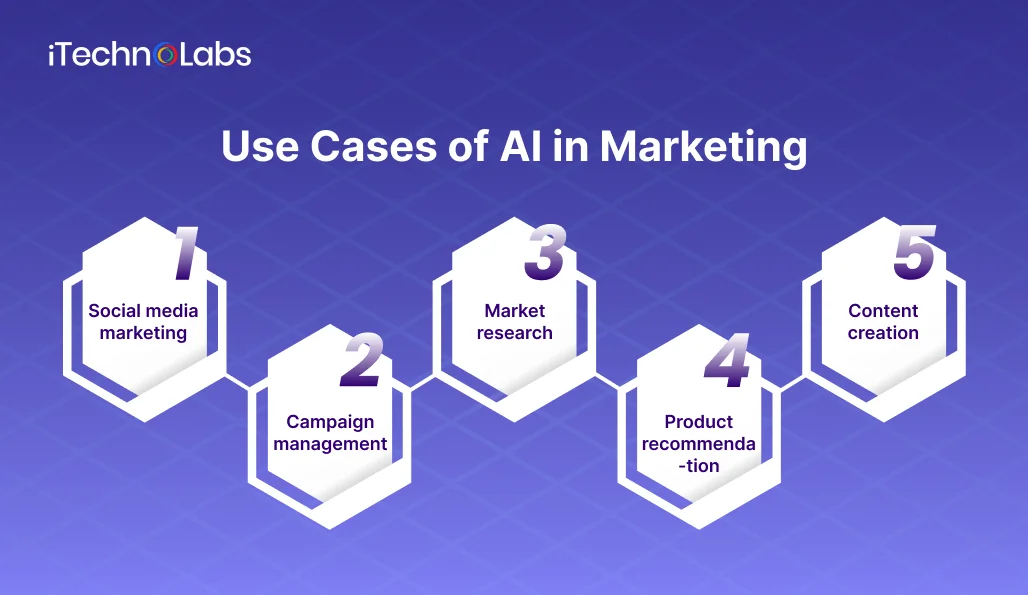
Beyond automation, AI in marketing is used for a variety of other purposes. The following are some of the most common applications of AI in marketing:
1. Social media marketing
AI helps make social media marketing easier. It studies what people like online. It shows ads to the right people. It helps create fun posts and pictures. It checks which posts do well. It saves time for marketing teams. It helps brands talk better with people. AI makes online marketing smart and quick.
2. Campaign management
AI helps plan and run marketing campaigns easily. It studies what people like online. It sends the right ads to them. It checks which ads work the best. It saves time for marketers every day. It helps them make smart choices fast. AI makes marketing fun and super simple.
3. Market research
AI helps companies study what people like. It looks at shopping and online data fast. It finds trends humans might miss easily. Businesses use this to plan smartly. They learn what products to make next. AI saves time and reduces guesswork. It helps companies understand customers better every day.
4. Product recommendation
AI helps shops show products you may like. It looks at what you buy before. Then it finds other things you might enjoy. This makes shopping easier and faster for you. Stores use this to sell more things. AI learns your likes and helps you choose better.
5. Content creation
AI helps people make fun and useful content. It can write stories, posts, and ads fast. It understands what people like to read. It also helps make pictures and videos. Marketers use AI to share ideas easily. It saves time and makes better content. AI is like a smart helper for creators.
Best practices for using AI in marketing
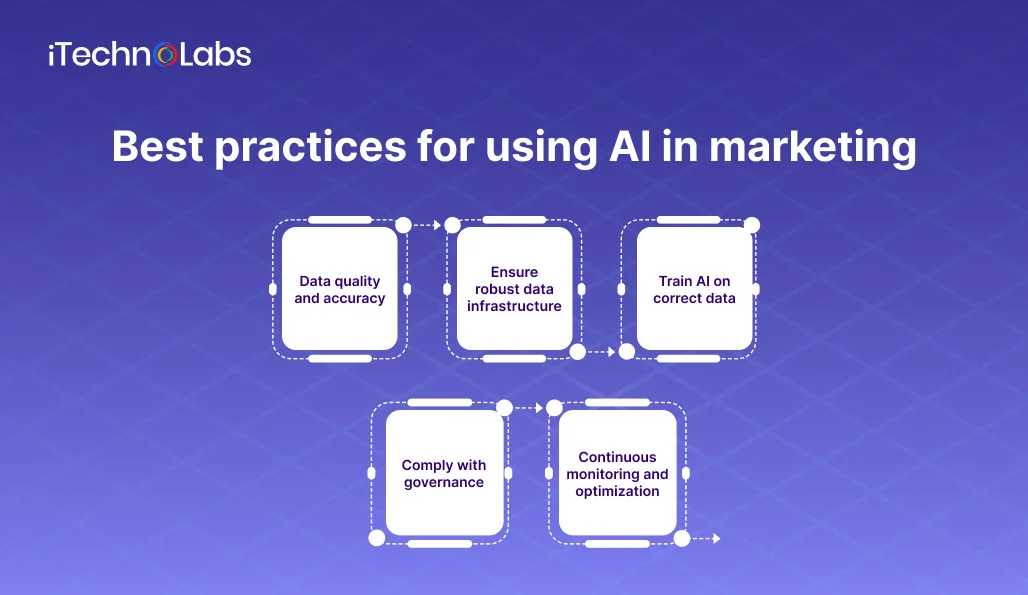
The benefits of AI in marketing are vast. However, to take advantage of AI in marketing, there are some good practices that you should follow. Here are the best practices to follow while using AI in marketing:
1. Data quality and accuracy
Good data helps AI make smart choices. When data is clean and correct, AI gives better results. Wrong data can confuse AI systems easily. Marketers must check facts before using them. Accurate data helps reach the right people. It also builds trust with customers. So, always keep data neat and true.
2. Ensure robust data infrastructure
To use AI in marketing, we need strong data systems. These systems store and organize information safely. They help AI learn faster and make better choices. Without good data, AI can get confused easily. So, companies must keep data clean and updated. This helps AI give smart ideas and improve marketing results.
3. Train AI on correct data
To make AI smart in marketing, give it correct data. Wrong data can confuse AI and give bad results. Good data helps AI learn what people like. It shows patterns and trends clearly. When AI learns correctly, it helps marketers make better choices. Always feed AI clean and true information for success.
4. Comply with governance
Using AI in marketing means following rules. Companies must always protect people’s data. They should be honest and fair. AI should not cheat or trick anyone. Leaders must check that AI works safely. Following these rules builds trust with customers. It keeps businesses safe and helps everyone. Good governance is a smart, kind choice.
5. Continuous monitoring and optimization
Continuous monitoring means watching how AI works closely. Optimization means making AI better over time. Marketers check results every day. They change things that do not work. This helps AI give better ads. Customers see what they like most. It saves money and makes people happy.
Also, read: AI Chatbot in Healthcare: Transforming Patient Care with Medical AI Chatbots
Conclusion
Using AI tools and technology can put you ahead of competitors. The AI not only saves time, money, but also helps to make informed decisions, cater to the customers’ needs better, and more. The common AI technologies used in sales and marketing are machine learning, natural language processing, generative AI, computer vision, edge AI, and more. The advantages of utilising AI in sales and marketing are improved personalization, enhanced efficiency, and task automation. If you want to implement AI in sales and marketing, connect with a reliable AI development company.

